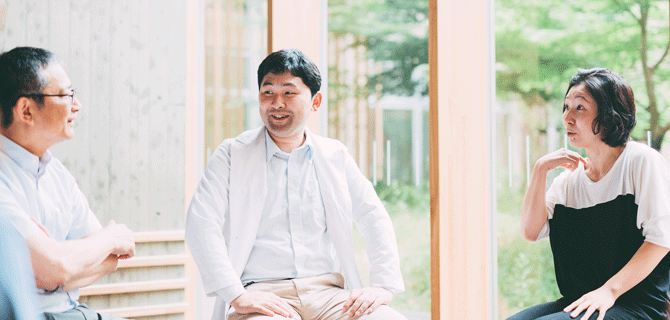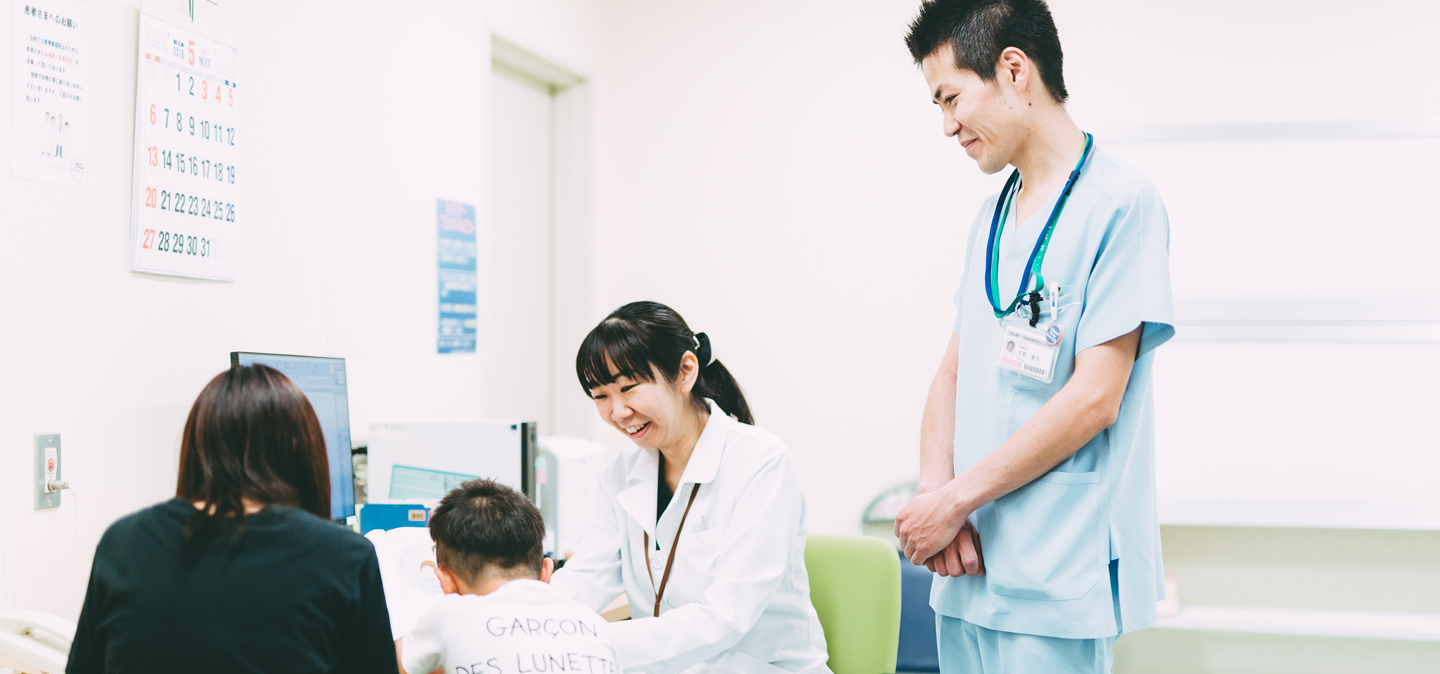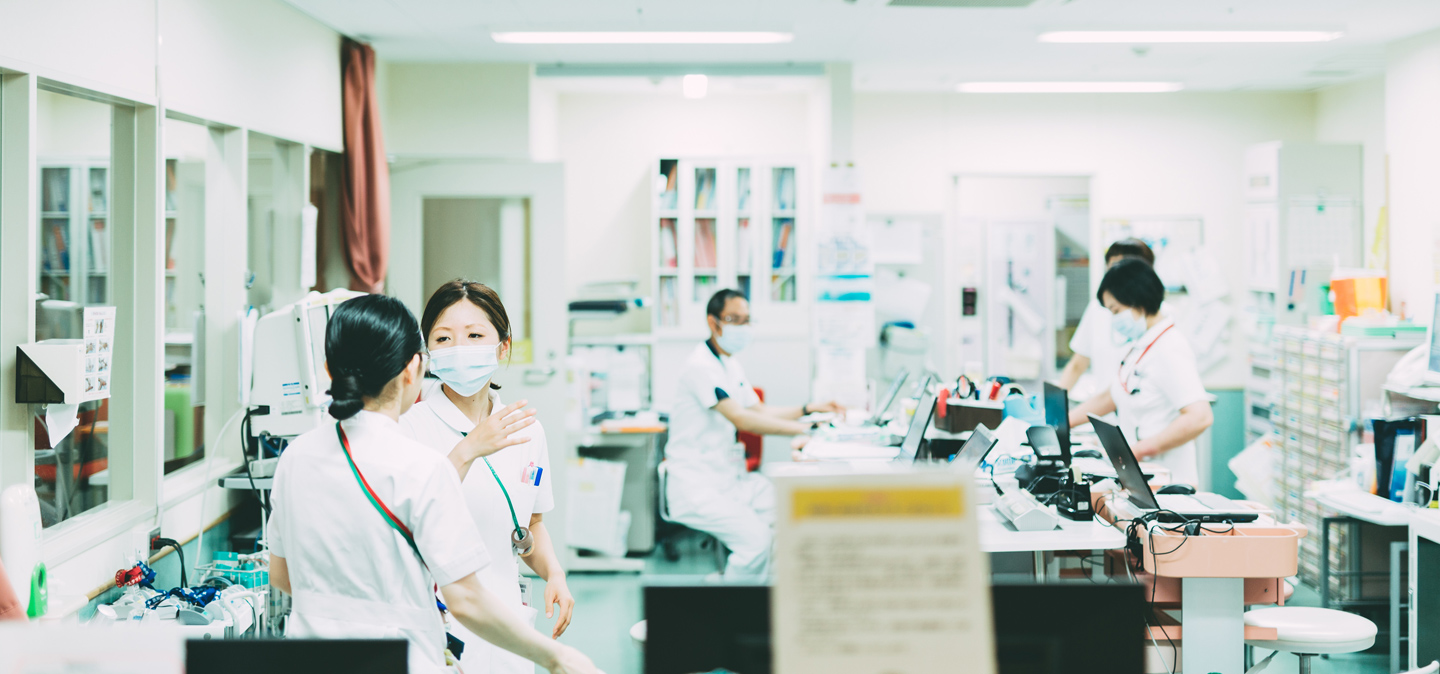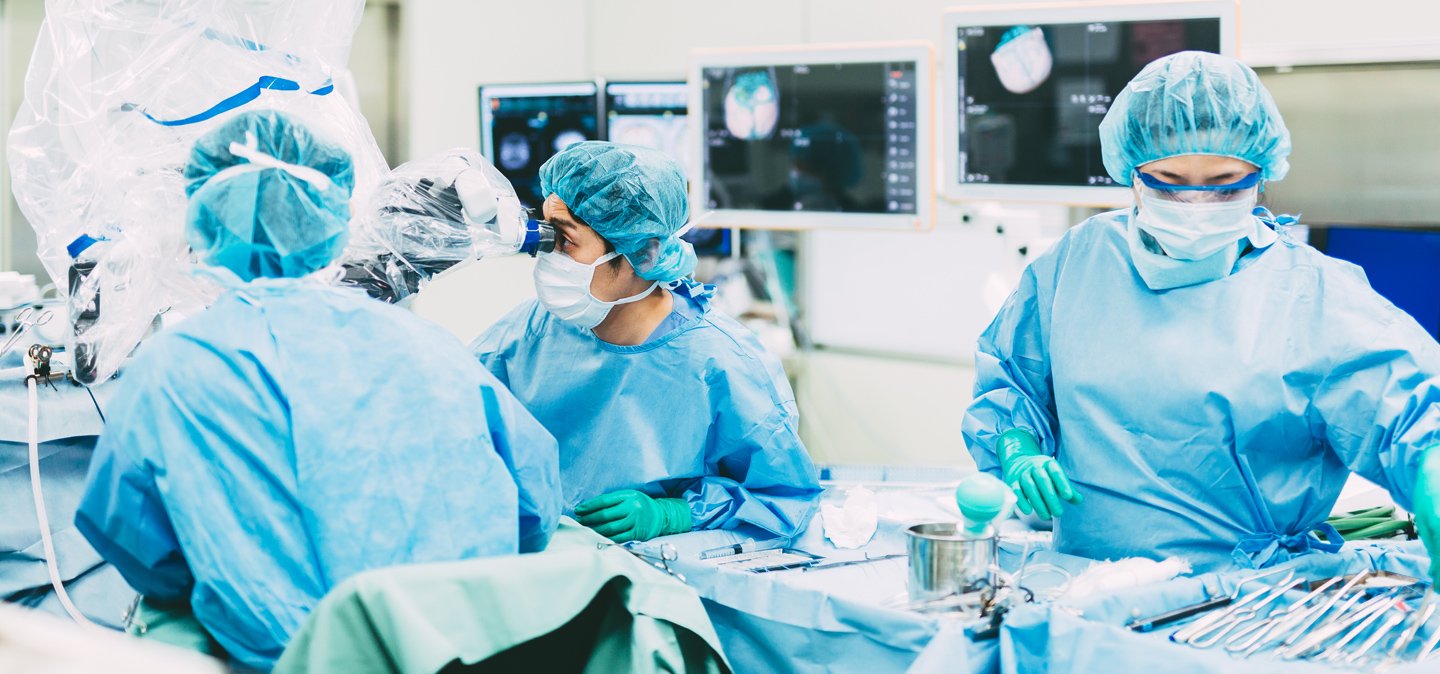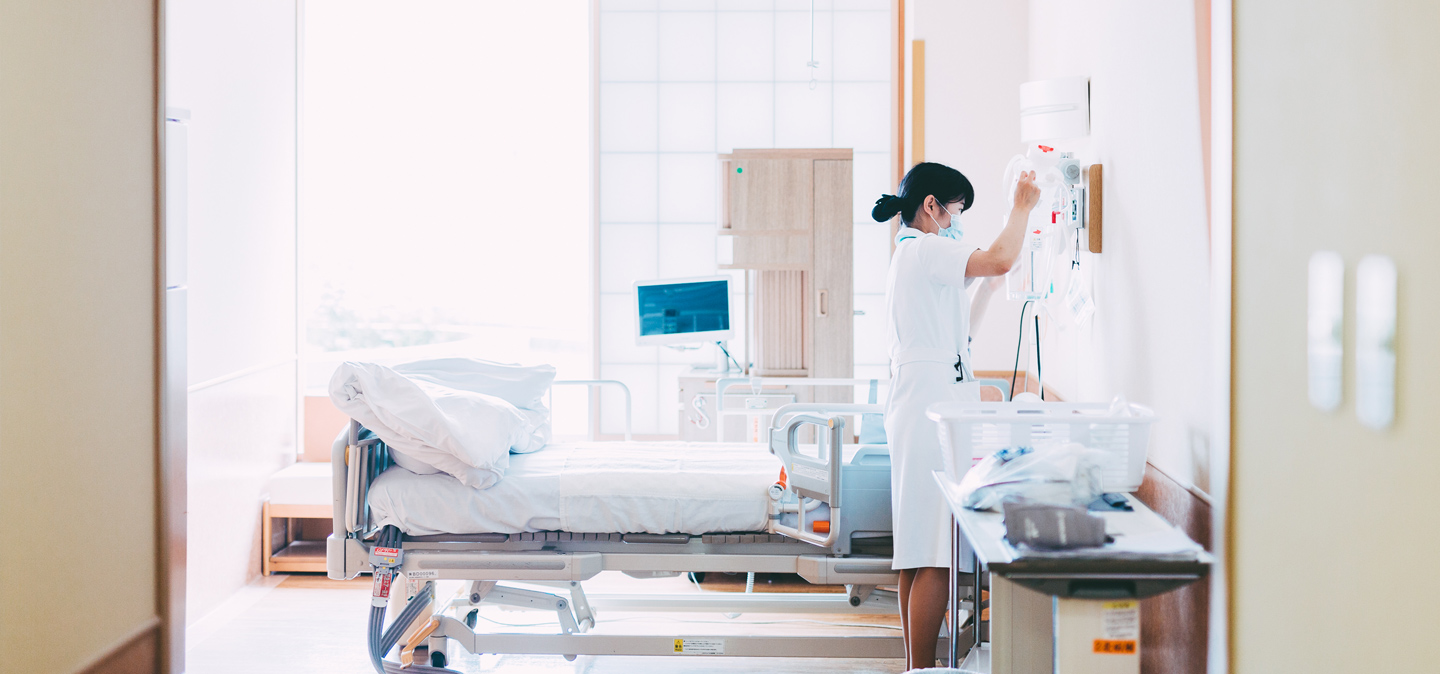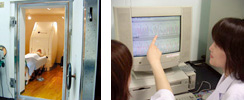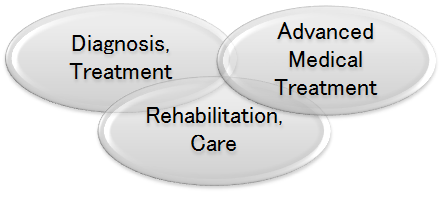We will:
1. Provide comprehensive and advanced medical care for the full range of muscular diseases.
2. Be engaged in promoting clinical research/studies to overcome muscular diseases.
3. Contribute to progress in medical treatment for muscular diseases by collaborating with institutions both within and outside of Japan.
We are working as a multidisciplinary team providing medical care and conducting research to offer comprehensive care for muscular diseases. The National Center of Neurology and Psychiatry has been involved in medical care and research for muscular diseases over several decades. It has also been a leading member of the Muscular Dystrophy Research Group which has a history of more than 40 years. Based on these experiences and collaboration among departments, the Muscular Disease Center aims to contribute to progress in medical treatment for muscular diseases.
Diagnosis and Treatment
We establish a diagnosis for patients with possible muscular disease and/or treat patients with documented muscular disease, with application of the latest findings.
1.Diagnosis: Diagnostic procedures such as electrophysiological testing, imaging, muscle pathology and genetic testing are used to make a correct diagnosis and provide informative data for subsequent treatment. Especially, muscle pathology meets the highest world standards both qualitatively and quantitatively, with more than 12,000 cases being diagnosed since 1978. Furthermore, detailed analyses employing more than 20 types of immunohistochemical staining are performed in all patients (Department of Neuromuscular Research). In addition, we serve as an important base for genetic diagnosis, particularly of facioscapulohumeral muscular dystrophy (FSHD), because our center is the only institution at which genetic diagnosis of FSHD is available in Japan and there are very few of these institutions worldwide (Section of Molecular Diagnosis and Department of Laboratory Medicine).
2.Genetic counseling: Clinical specialists in this field and certified genetic counselors provide genetic counseling. When a genetic diagnosis is made, an attending physician and the Genetic Counseling Unit work together closely to assure that due consideration is also given to patient's psychological state. The Department of Outpatient Genetic Counseling Clinic is also available for consultation regarding carrier detection and prenatal diagnosis.
3.Treatment: We administer medications (e.g., steroids), ventilation therapy, treatment for cardiomyopathy and other therapies. As a leading member of the Muscular Dystrophy Research Group, we are committed to improving and standardizing treatment modalities.
4.We have specialized outpatient clinics (Department of Child Neurology, Department of Neurology, Department of Orthopedics, Department of Rehabilitation Medicine). We are among the hospitals most frequently treating muscular diseases in Japan; patients have been referred to us from around the country.
5.We have organized a public symposium for muscular dystrophy ever year, which has been attended by more than 150 participants annually in recent years. As of July 2013, a total of 10 symposiums had been held. Details of the next symposium are available on our website (http://www.ncnp.go.jp/). We endeavor to provide information about treatments for muscular diseases through lectures within and outside of Japan, publications, our website, and so on.
6.How to visit the Outpatient Clinic: Advance reservation only. If you would like to have an outpatient consultation, please first make an appointment for a new patient at the Department of Child Neurology or the Department of Neurology by calling the Outpatient Reservation Service (TEL: 042-346-2190, Reception hours: 9:00-15:00 on weekdays). At this time, you need to inform the operator, for example, that the patient being brought in is suspected to have a muscular disease or has already been diagnosed with a muscular disease. Hospitalization without an outpatient consultation may be arranged depending on the situation, if you live far from our center and require inpatient examination and/or treatment. Such requests should be directed to us by the patient's attending physician.
Rehabilitation and Care
Definitive treatments are not available for most muscular diseases. However, continuation of periodic examinations/assessments and appropriate care have improved the life circumstances and outcomes of patients. We provide multidisciplinary care with the aim of achieving an improved quality of life, etc.
1.With an eye to the future, we offer rehabilitation appropriate for the stage of disease. Patients with insufficient expectoration of sputum and other respiratory disorder symptoms may receive pulmonary rehabilitation and home mechanical ventilation. We conduct a consultation aimed at devising a support system for achieving better home care. We currently support operation of the Family Association for Muscular Dystrophy, consisting mainly of families of patients seen in our center.
2.Medical care at each department
A)Dental care is provided for misalignment of teeth, poor oral hygiene, etc.
B)Nutritional consultation is conducted by registered dieticians. along with objective evaluation.
C)The Dysphagia Research Clinic provides assessment and treatment to patients with muscular disease who have difficulty in eating and drinking. The clinic is run by the medical team consisting of a neurologist, dentists, nurses and speech and language therapists, all experts in dysphasia.
D)Gastrostomy is available with management of the gastrostomy site for patients, as an example, who find it difficult to maintain their physical conditions with oral feeding alone.
E)The Department of Orthopedics, which has a good understanding of muscular diseases, is involved in medical care.
F)There are certain key points to consider when anesthetizing patients with muscular diseases. The Department of Anesthesiology uses special care and an appropriate anesthetic in such patients.
Promotion of Advanced Medical Treatment
Definitive treatments are not available for most muscular diseases. Since all muscular diseases are rare (i.e., the number of affected patients is limited), many challenges are faced in the collection of patient information and in conducting clinical studies. To move beyond the status quo, it is essential to develop a system which allows the application of research findings to clinical practice as quickly as possible, establishment of an international network, and active involvement in the network. We are committed to developing advanced diagnostics and treatments for muscular diseases in cooperation with other countries throughout the world.
1.We have conducted clinical studies for muscular dystrophy; as of the end of August, 2013, 4 studies are ongoing.
2.We make a unique diagnosis which would not be practical at other institutions by applying new findings, obtained in various Institutes, to carry out diagnostic procedures as quickly as possible.
3.Institutes and Hospitals work together closely to establish a system for developing advanced medical treatments, including clinical studies on muscular diseases.
A)Prior to conducting clinical studies, we created a patient registry system for muscular dystrophy as a member of the Muscular Dystrophy Study Group. The Registry of Muscular Dystrophy is responsible for the management and operation of this system (Remudy: http://www.remudy.jp/).
B)The Muscular Dystrophy Clinical Trial Network has been established, with the aim of promoting clinical studies on muscular dystrophy in Japan. The administrative office is based at our center (http://www.mdctn.jp/).
C)We are working as a full member of the Cooperative International Neuromuscular Research Group (CINRG: http://www.cinrgresearch.org/), a clinical research group for muscular dystrophy led by the Children's National Medical Center in the United States. In addition, we collaborate with Translational Research in Europe-Assessment and Treatment of Neuromuscular Diseases (TREAT-NMD: http://www.treat-nmd.eu/), a clinical research group for neuromuscular diseases in Europe, in organizing a patient registry and conducting global studies.
D)As a leading member of the Asian and Oceanian Myology Center as well as the World Muscle Society, we are actively exchanging information about advanced medical treatments.
E)In addition to facilitate exchange of views between Institutes and Hospitals, we are actively communicating with external parties including regulatory authorities (i.e., organizations responsible for the authorization of medications such as the Ministry of Health, Labour and Welfare and the Pharmaceuticals and Medical Devices Agency) and pharmaceutical companies.
Relevant Departments and Core Members of the Muscular Disease Center
Director of Center: Hirofumi Komaki
Department of Child Neurology: Akihiko Ishiyama, Hirofumi Komaki, Masayuki Sasaki
Department of Neurology: Yasushi Oya, Madoka Mori, Miho Murata
Department of Rehabilitation Medicine: Yoko Kobayashi, Yasuyuki Iwata
Department of Surgery: Takeshi Miyama
Department of Dentistry: Yutaka Fukumoto
Department of Anesthesiology: Tetsuji Nakai
The Dysphasia Research Clinic: Toshiyuki Yamamoto
Department of Clinical Research Unit: Akemi Tamaura
Section of Molecular Diagnosis and Department of Laboratory Medicine, Genetic Counseling Unit: Yukiko Sato, Eri Takeshita, Yu-ichi Goto
Translational Medical Center: Reiko Shimizu, En Kimura, Shin'ichi Takeda
Department of Neuromuscular Research, National Institute of Neuroscience: Ichizo Nishino
Many other staff members are also involved in medical care/research for muscular diseases.
Contact person for inquiries about the Muscular Disease Center: Hirofumi Komaki

E-mail medical consultation for patients is not available.
Links, Websites that are helpful for obtaining information about muscular diseases
Translational Research in Europe - Assessment and Treatment of Neuromuscular Diseases (TREAT-NMD)
http://www.treat-nmd.eu/
The organization's aim is to facilitate medical care, patient registry, and research for neuromuscular diseases mainly in Europe.
Cooperative International Neuromuscular Research Group (CINRG)
http://www.cinrgresearch.org/
This research group for muscular diseases is led by the Children's National Medical Center in the United States. The National Center of Neurology and Psychiatry is a full member of the group.
